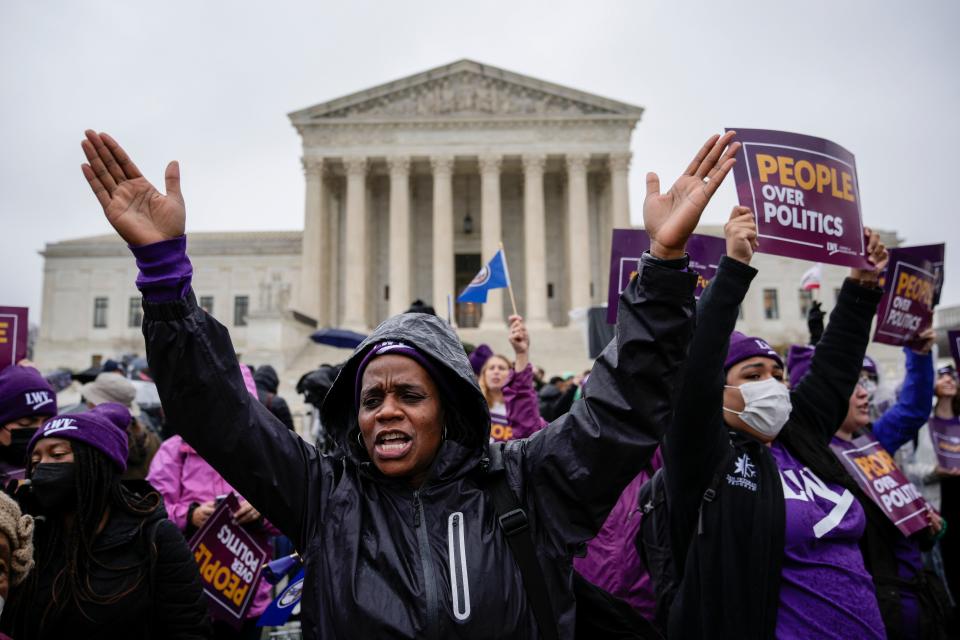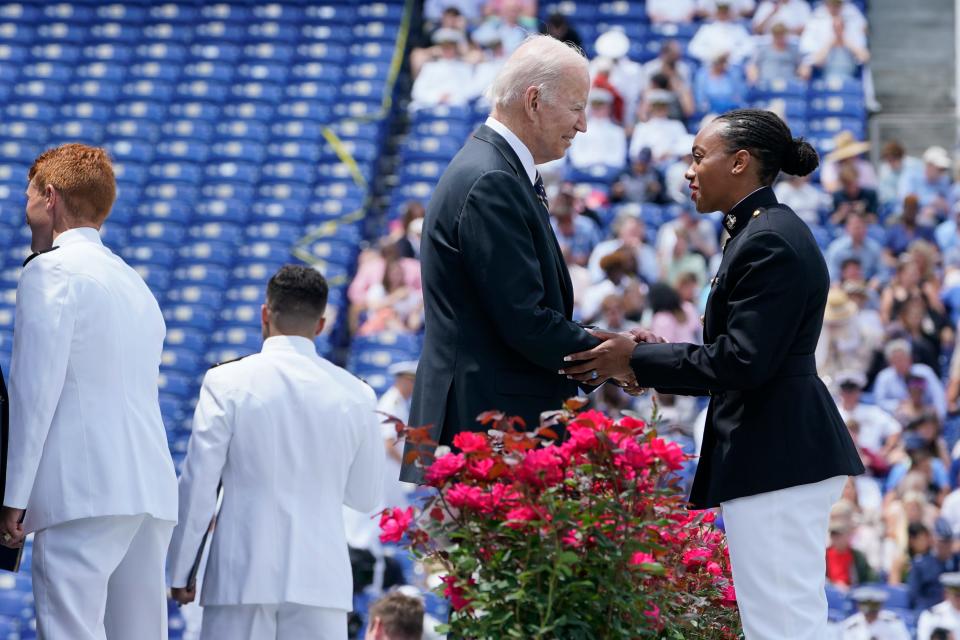Military interests parachute into Supreme Court cases on LGBTQ rights, elections
WASHINGTON – Some of the biggest issues to come before the Supreme Court in recent weeks – from affirmative action to LGBTQ rights – have featured a common theme on their dockets: They've drawn the interest of groups with ties to the military.
In a high-profile battle over a graphic designer who wants to decline to make websites for same-sex weddings, a group representing LGBTQ servicemembers fears the court's decision could harm gay and lesbian families assigned to bases in rural America. In a case about states' power to set election rules, a group of retired generals and admirals is worried about "civil unrest" in contested elections "leading to military intervention."
Just how much influence amicus briefs have at the Supreme Court has long been open to debate, particularly when groups are weighing in on questions that implicate them indirectly. But the justices have at times shown deference to arguments raised by former military brass, including in a landmark affirmative action case in 2003.
Guide: A look at the key cases pending before the Supreme Court
Biden: Biden's ability to bypass Congress faces 'major' legal hurdle at Supreme Court
Stay in the conversation on politics: Sign up for the OnPolitics newsletter
"If you can articulate the interest in a way that affects how the military will do its business then the court has always worried about that," said Carter Phillips, a veteran Supreme Court lawyer and the lead counsel on a brief in the 2003 case, Grutter v. Bollinger, that allowed universities to consider the race of applicants as one factor in admissions.
Amicus – or "friend of the court" – briefs let people who are not a party to a lawsuit offer perspective. The number of amicus briefs increased from 715 in the term that ended in 2011 to more than 900 in the one that wrapped in 2020, according to a National Law Journal report. A USA TODAY analysis identified more than 1,000 amicus briefs in the term that ended in June.
Phillips' brief, filed on behalf of retired military leaders like Gen. H. Norman Schwarzkopf and Gen. Wesley Clark, argued a lack of diversity in the officer corps harmed the military during the Vietnam era. The best solution, the retired leaders said, was to promote diversity at the service academies and higher education generally.
The 5-4 majority cited the brief in its opinion.
"It was an extraordinary story that was true," Phillips said. "I think it caught a number of the justices a little off guard because it wasn't a story anybody had told before."

Repeat performance?
That same debate is back before the Supreme Court in two of the most closely watched cases this year. The justices are weighing challenges to race-conscious admissions policies at Harvard College and the University of North Carolina. Amicus briefs connected to military interests have sought to boost both sides.
A group of 35 former military leaders told the Supreme Court in August that "diversity in the halls of academia directly affects performance in the theaters of war."
But a group called Veterans for Fairness and Merit told the court that "no national security imperative serves as a compelling national interest to justify the use of racial preferences."
On the horizon: Next legal battle over race and education has already begun
Argument: Supreme Court signals skepticism of race-conscious college admissions
'Sordid business': Supreme Court admissions fight puts focus on Roberts
The issue featured in oral arguments in those cases earlier this year. Representing the Biden administration, Solicitor General Elizabeth Prelogar described diversity as "vitally important to our nation's military." But she fielded skeptical questions from some of the court's conservative justices, including Associate Justice Samuel Alito.
"What you say about the military is something that we have to take very seriously," Alito said. But, Alito asked, what should the court make of the fact that the United States government was on the other side of the case under the Trump administration? Prelogar responded that the prior administration had a different reading of the facts of the case.
Patrick Strawbridge, representing the group challenging the race-conscious admissions policies at Harvard and UNC, said there was no evidence that ROTC candidates from states and colleges that already bar race-conscious admissions were less diverse.
"The lawyer for the plaintiffs said that colleges that do not use affirmative action, such as Texas A&M, are still able to provide diverse classes for ROTC," said Josh Blackman, a law professor at South Texas College of Law Houston. "I do not think Prelogar's argument will gain much traction on the court, as it did two decades ago."

Other legal battles
In the LGBTQ case, the issue is whether anti-discrimination laws that bar businesses from refusing customers based on their race, gender, or sexual orientation may compel a company making websites to communicate a message to which its owner objects. The website designer, Lorie Smith, says she objects to same-sex marriage on religious grounds.
A group called the Modern Military Association of America told the court in August that LGBTQ servicemembers could be harmed by carveouts to state anti-discrimination laws. Servicemembers often don't choose where they live, the group wrote. An LGBTQ family being turned away from a store in a rural area, they said, would present an especially difficult problem if another nearby business isn't available.
In a major voting rights case dealing with how much power state legislatures should have to set the rules for federal elections, a group of retired four-star admirals and generals told the court in October that a legal theory embraced by North Carolina Republican lawmakers asserting state courts should have little role in reviewing such election rules could "undermine election integrity" and risks politicizing the military.
LGBTQ: Court signals support for website designer who wants to decline same-sex weddings
Voting: Supreme Court grapples with case some warn could upend federal elections
It's common for groups tied to the military to wade into Supreme Court litigation, though it doesn't always happen. There were no similar briefs last term in the case that led to the overturning of Roe v. Wade, for instance, nor in a major Second Amendment decision that struck down a New York law on carrying guns.
Paul Collins, a professor of legal studies and political science at the University of Massachusetts Amherst, speculated that the influence of such briefs likely depends, in part, on whether they're offering a fresh perspective about how a seemingly unrelated issue might have national security implications.
"I think that, like pretty much all friends of the court, the motivation to file these briefs comes from a genuine desire to shape the outcome of the court's decisions," Collins said. "It’s not clear that the military briefs have any special influence, but I have a strong sense they likely get closer consideration than the average amicus brief."
This article originally appeared on USA TODAY: Military groups engaged in major legal battles at the Supreme Court

